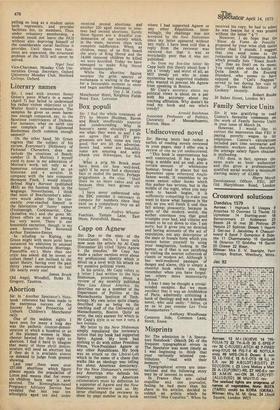Capp on Agnew
Sir: Due to the state of the transatlantic mails, I have only now seen the article by Al Capp (December 23) titled ' Spiro Agnew v. the trendies.' Mr Capp has made a rather careless error about my professional identity which is about on a level with his attack on my putative political views. In his article, Mr Capp refers to a letter I had written to the New Statesman, protesting about a review of my recently published Nine Lies About America. He describes me as a member of the Department of Politics at the Massachusetts Institute of Technology. My own letter quite clearly described me as being on the teaching staff of the University of Massachusetts, Boston. Quite an error, the only answer for which in Mr Capp's style is se non e vero, e ben trovato.
My letter to the New Statesman simply repudiated the reviewer's notion that my book had supported Spiro Agnew. My book had nothing to do with either President Nixon, Vice-President Agnew or any other Republicans. My book was an attack on the Liberal-Left which in the name of a chaos that walks like an ideology was telling lies about American democracy. For the New Statesman's reviewer, any American who defends his country against its American calumniators must by definition be a supporter of Agnew and the New Statesman review2r said so. My letter challenged the reviewer to show by page number in my book where I had supported Agnew or any other Republican. Interestingly, the challenge was not accepted by the New Statesman since my letter appeared without any reply. I have been told that a reply from the reviewer was received but that it was so wretchedly poor that it was not published.
So from my five-line letter Mr Capp built this theory about how I am a ' trendy ' and worst of all, an MIT trendy yet who in some mysterious way supported students who wanted to prevent Mr Agnew from speaking in Boston.
Mr Capp's accuracy about my political views is about on a par with his accuracy about my teaching affiliation. Why doesn't he read my book and see who's trendy?
Arnold Beichman Associate Professor of Politics, University of Massachusetts, Boston, Mass


































 Previous page
Previous page